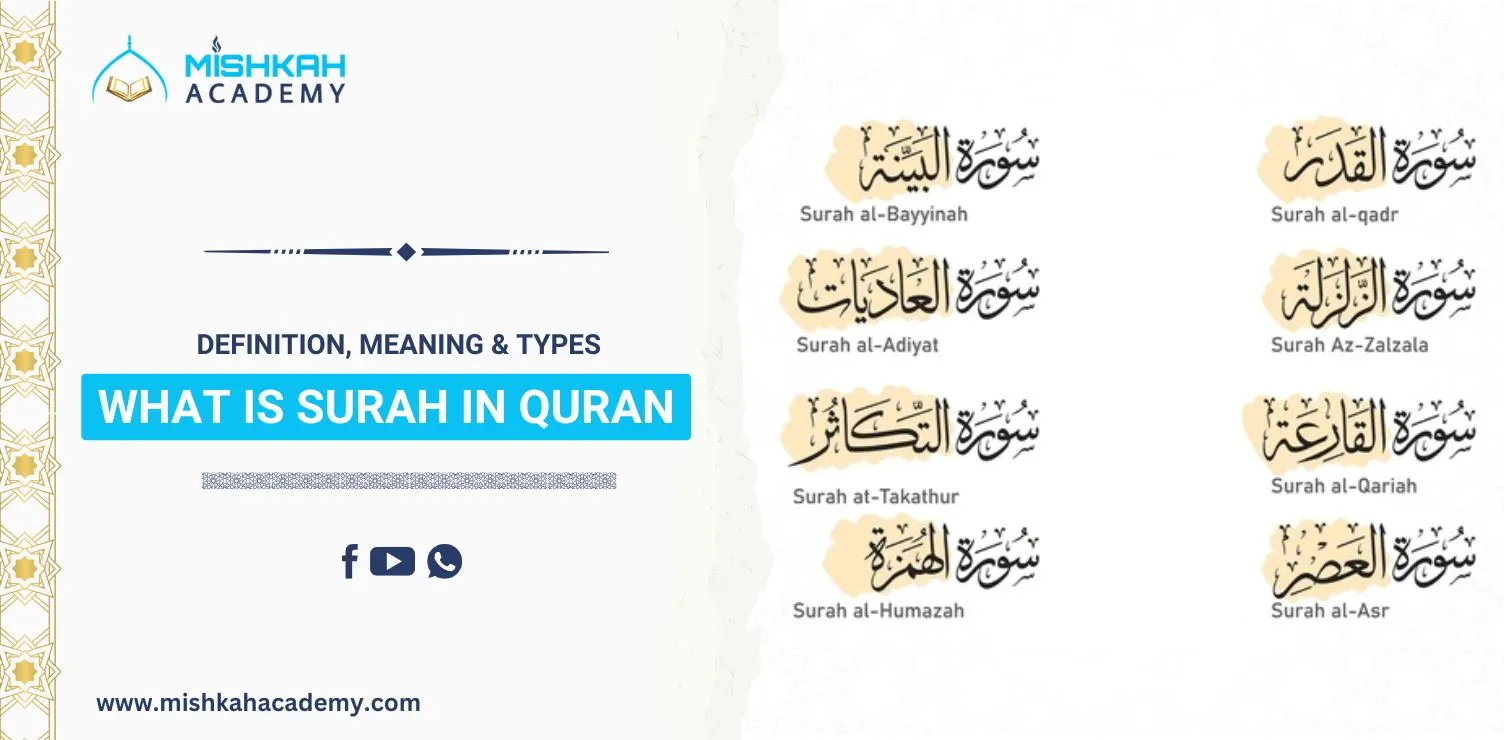A Surah in the Quran is a chapter of verses called Ayahs, revealed to the Prophet Muhammad (peace be upon him) by Allah. The Quran contains 114 Surahs, each varying in length and covering themes like guidance, spirituality, morality, and laws. Surahs have specific names, often tied to their central message or story. For example, Surah Al-Fatihah (“The Opening”) is a key chapter in daily prayers.
Muslims use Surahs for worship, seeking guidance, and reflecting on divine teachings. The guide details everything about Surahs – what they mean, their origin, classifications, structure and content, etc.
What is Surah in the Quran?
Table of Contents
ToggleMeaning
The word Surah comes from the Arabic term “سورة,” which translates to “chapter” or “step.” In the Quran, a Surah refers to one of the 114 chapters that comprise this holy book, each of varying lengths. Surahs range from Surah Al-Kawthar with three verses to Surah Al-Baqarah with 286 verses. These chapters are distinct and complete units with unique themes and messages.
The arrangement of Surahs in the Quran, from longest to shortest (with some exceptions), reflects divine wisdom rather than chronological order. Each Surah is integral to the Quran’s comprehensive guidance for humanity.
Origin
The Surahs were revealed to Prophet Muhammad (peace be upon him) over 23 years, beginning in 610 CE. The first revealed Surah was Al-‘Alaq (96:1–5), emphasizing the importance of knowledge and the Creator.
Surahs were revealed at different times and places, addressing various needs and situations during the Prophet’s mission. They were memorized and documented under the Prophet’s supervision and later compiled in their current order during the Caliphate of Abu Bakr (632–634 CE). This compilation ensured the preservation and standardization of the Quran as a unified text for all Muslims.
Classification (Types)
Surahs are broadly categorized based on where and when they were revealed:
- Makki Surahs
Revealed in Mecca, these Surahs focus on monotheism, the afterlife, and moral guidance. They are usually shorter and poetic, emphasizing belief in Allah and spiritual development. Examples include Surah Al-Fil and Surah Al-Ikhlas. - Madani Surahs
Revealed in Medina after the Prophet’s migration in 622 CE, these Surahs address social, legal, and community matters. They are longer and deal with detailed instructions on family, inheritance, and governance. Examples include Surah Al-Baqarah and Surah An-Nisa.
The classification highlights the evolving nature of revelation, adapting to the spiritual and practical needs of the growing Muslim community. Understanding this categorization is crucial for grasping the Quran’s historical and contextual depth.
Structure and Content
A Surah typically begins with “Bismillah-ir-Rahman-ir-Rahim” (In the name of Allah, the Most Gracious, the Most Merciful), except for Surah At-Tawbah.
Each Surah is divided into verses (Ayahs), with varying lengths. For example, some Ayahs consist of one word, while others form extended sentences. The Quran contains 6,236 Ayahs in total.
Surahs are further divided into logical sections called Rukus, designed for easier recitation and thematic understanding. The content of a Surah may include stories of past prophets, ethical and legal guidance, warnings, and promises of reward.
For instance, Surah Yusuf narrates the story of Prophet Yusuf, while Surah Al-Baqarah covers faith, worship, and societal laws. These divisions ensure clarity and thematic unity, making the Quran accessible and impactful for its readers.
Note: Enroll in the Mishkah Academy online hifz course to start your surah memorization journey with hifz teachers.
Start Your Quran Surah Learning Journey NowImportance of Surahs
Here are some points focusing on the importance of Surahs for Muslims:
- Surahs guide Muslims in worship, forming a significant part of daily prayers (Salah), with specific Surahs like Al-Fatihah recited in every unit of prayer.
- Each Surah provides spiritual and ethical guidance, helping Muslims understand life with clarity and purpose.
- Surahs like Surah Al-Ikhlas emphasize the oneness of Allah, strengthening faith and belief in monotheism.
- They offer solutions to personal and societal challenges, as seen in Surah An-Nisa, which addresses family and social issues.
- Reciting Surahs brings blessings, as promised in numerous Hadiths, enhancing spiritual rewards and personal connection with Allah.
- Surahs like Surah Al-Kahf protect against trials, particularly the trials of the Dajjal (Antichrist).
- Surahs serve as a source of peace and comfort during difficult times, with chapters like Surah Ad-Duha offering hope and reassurance.
- They encourage moral excellence, as many Surahs detail examples of the Prophets and their unwavering faith
- Emphasize the importance of understanding Arabic to truly grasp the depth of the Quranic language. However, translations and explanations also play a significant role.
- Point out that each Surah often has a historical or situational context, and understanding this context can help learners relate more personally to its teachings.
- Studying Surahs provides clarity and direction, helping learners cultivate a strong moral foundation and inner peace.
The Purpose and Themes of Surahs
Explore the themes and significance of Surahs in the Quran. Here, emphasize the diversity of content in the Quran and how each Surah brings unique insights and guidance.
- Guidance for Life: Many Surahs provide guidance on daily life, ethics, and spirituality, such as Surah An-Nisa, which addresses family and societal matters.
- Strengthening Faith: Explain how certain Surahs, like Surah Al-Fatiha, are recited in daily prayers, serving as a constant reminder of the relationship between Allah and humankind.
- Stories of Prophets: Many Surahs recount the stories of past Prophets, like Surah Yusuf, providing moral lessons and illustrating the journey of faith and resilience.
Principles of Justice and Mercy: Surahs like Surah Ar-Rahman discuss the balance of Allah’s mercy and justice, offering insights into the divine attributes.
How are Surahs Arranged in the Quran?
Surahs in the Quran are arranged neither chronologically nor thematically. Instead, they follow a divinely inspired order. The Quran begins with Surah Al-Fatihah (The Opening) and progresses with longer chapters like Surah Al-Baqarah, placed early, while shorter chapters, such as Surah Al-Kawthar, appear later.
This arrangement was finalized during the time of Prophet Muhammad (peace be upon him) and preserved by his companions under divine guidance.
What is the Longest Surah in the Quran?
The longest Surah in the Quran is Surah Al-Baqarah (Chapter 2), consisting of 286 verses. It addresses various topics, including laws, stories of prophets, and guidance for believers.
Surah Al-Baqarah is a Madani chapter revealed in Medina. It emphasizes the importance of faith, patience, and societal rules. It contains Ayat-ul-Kursi (Verse 255), considered one of the most powerful verses in the Quran.
What is the Shortest Surah in the Quran?
The shortest Surah in the Quran is Surah Al-Kawthar (Chapter 108), consisting of just three verses. Despite its brevity, this Makki Surah holds profound meaning, emphasizing Allah’s blessings upon Prophet Muhammad (peace be upon him) and the significance of prayer and sacrifice.
It reassures the Prophet of abundant goodness (Al-Kawthar) granted to him and offers timeless spiritual lessons.
What is the Difference Between a Surah and Ayah?
A Surah is a chapter in the Quran, while an Ayah is a verse within a Surah. The Quran contains 114 Surahs and a total of 6,236 Ayahs.
Surahs vary in length, containing anywhere from 3 to 286 Ayahs. Ayahs are the building blocks of Surahs and may consist of a single word or several sentences. Together, they deliver the Quran’s comprehensive guidance message and divine wisdom.
Final Words
Surahs form the Quran’s backbone, offering Muslims divine guidance, spiritual inspiration, and practical teachings. Understanding their structure, classification, and content is key to appreciating the Quran’s wisdom.
Mishkah Academy excels in teaching Quranic Surahs with a team of experienced online quran tutors. They provide tailored guidance, helping students of all levels master the Quran’s teachings effectively and meaningfully.
Start Your Quran Surah Learning Journey Now





